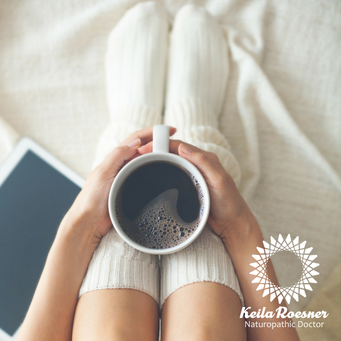 Let’s face it: having a cold sucks. You know you’re going to be out of the game – or at least not at your best – for a few days. Having cold and kids – or kids with colds – is even worse. Contrary to popular belief, over-the-counter products marketed to help you push through the day are NOT the best way to get over a cold. While they can be helpful if you absolutely cannot miss a day, they do nothing to support your immune system. If you’ve been burning the candle at both ends, it’s not unusual for your body to take a little hit and become vulnerable to whatever virus is going around. The best cold & flu prevention is keeping your body in good shape so that your defenses don’t go down. In the event that you do find yourself under the weather, here’s one of my favorite ways to reduce congestion and support the immune system. I have consistently found that this helps reduce recovery time and helps me feel a lot more human. What is it? Magic Socks. Because they work so beautifully in kids, are safe, easy and inexpensive. I do this at the first sign of a cold, and recommend it to my patients as well. You need:
Here’s what you do:
Your socks should be completely dry by the morning with warm feet. Repeat for 2-3 nights to decrease sinus congestion and help you sleep. Now of course, you want to make sure that your feet are warm before starting the treatment, to avoid getting a chill. You will also want to do this as a part of your Naturopathic cold treatment program and work with your health care provider to make sure that you are recovering well and not dealing with a more serious health concern. As always, use your best judgement. Want to really reduce your risk of getting sick? Sign up for my natural Cold & Flu Prevention program. In health, Dr. Keila Roesner BHSc ND Reference: “Lectures in Naturopathic Hydrotherapy” by Wade Boyle, N.D & Andre Saine, N.D. Eclectic Medical Publications, Sandy Oregon 1988.
0 Comments
 This week a regular patient of mine and I were chatting and she said: "But Keila, I don't have time to exercise, and take my vitamins, meditate, walk, stretch, journal or any of that stuff!". This also wasn't the first time I'd heard this phrase. Often, it's me saying it in my own head. Maybe you've got stuck in the "Busy" trap. It sounds something like, "So, what've you been up to?" "I've just been soo busy!". Newsflash: We're all busy! We're all stressed! This bouncing around from one activity to the next is exhausting. We end up eating on the run, not exercising, becoming sleep deprived and getting short with our loved ones. It is no big secret that stress is associated with insomnia, anxiety, depression, heart disease and even periodontal disease. Yet, we become addicted to that feeling of being indispensable, needed and useful. While the notion of "self-care" may seem self-indulgent to some, really, it's a lifeline. Creating a plan for self care is really about creating practices that benefit your well-being, be it socially, emotionally, spiritually, physically, mentally or financially. Taking time out for yourself allows you to show up more effectively, confidently and rested in the rest of your life. It's about self-preservation. I like to break down self care into three parts: 1. Physical. This should include some daily movement, regular visits with your health care providers, healthy balanced meals, water, plenty of sleep. 2. Mental. Getting things off your chest via talking to someone, journaling, creating a plan. 3. Emotional. Spending time alone to process, as well as being social. Finding an outlet for our emotions that is constructive. I often recommend that my patients create a list of activities that they can do to take care of themselves, from each of these categories.. and then schedule some Non-Negotiable Time with themselves to do some of them on a regular basis. Scheduling is key. Treat it like any other commitment and show up on time. Here are some basics to get you started: 1. Take a 30 minute walk outside, alone or with a friend 2. Turn off the TV, phone and computer 3. Take yourself out for lunch or a coffee 4. Read a book for fun 5. Work out 6. Yoga 7. Call up a friend to catch up 8. Prioritize sleep. Set a regular bedtime and waking time. 9. Spend less time with people that drain you 10. Take a class, join a choir or a team If we can't set aside time for self-care, then we really have to look at our priorities. What can we delegate, or let go of? Really, if we can't care for ourselves, what's the point? The question isn't about not having the time or being able to afford to take care of ourselves. It's about using the precious time we have because we can't afford not to take care of ourselves. Naturopathic Medicine is really all about self care. As a physician, I teach people how to take good care of their bodies and minds, whether it is improving their diet, getting good quality sleep or acting as a sounding board. In many cases, a combination of herbs, supplements and acupuncture can do wonders for that sense of burnout. That same feeling that can drive us towards disease. The bottom line: can you afford to feel sick, tired, and burnt out? I know I can't. If you are interested in improving your energy, getting a good night's sleep and feeling better, you can schedule a free health strategy session with me here. In health, Dr. Keila Grab your FREE copy of my Calm the F Down Self Care Guide here. BYou have a busy life, active family and a demanding job. You asked for more and I was listening. And I want you to know that I get it. Your health is important, but so is the rest of your life. That's why as of June 2014 I will be adding an additional set of evening hours for Naturopathic and acupuncture appointments to serve you better. So, if you work 9-5 and can't get out of the office, work alternating shifts or simply function better later in the day I can accommodate your schedule better than any other health care provider in Stratford, ON. Book your FREE 15 minute consultation and find out why Naturopathic Medicine can help you feel better than ever. You can learn more about Naturopathic Medicine here.  http://cdn.vogue.com.au/media/articles/7/2/0/7267-1_n.jpg?150136 http://cdn.vogue.com.au/media/articles/7/2/0/7267-1_n.jpg?150136 Irritable Bowel Syndrome (IBS) affects people of all ages, however females, and young adults are most likely to be diagnosed. Symptoms can range from cramping, bloating, diarrhea, constipation, incomplete voiding, mucous, nausea and heartburn. Canada and other more well-off countries tend to have much higher rates of IBS, representing a major quality of life burden. While many people are told that they have IBS (and that's that), they might not realize that there's more to it than a bathroom crisis. 1. IBS is not a diagnosis, it is a catch-all. In medicine, we call this a diagnosis of exclusion. This means that before IBS is diagnosed, we need to rule out more serious pathology like Ulcerative Colitis, Crohn's Disease, Colorectal Cancer, Celiac Disease and other immune related conditions. If you are suddenly experiencing a change in bowel patterns, including mucous or blood in your stool, have unexplained weight loss, fever and family history of colon cancer, this merits a thorough medical workup. In the absence of these things, IBS is considered a functional disorder, wherein you experience the symptoms (which can sometimes be very severe) but very little can be seen via labwork or exploratory imaging. 2. Irritable bowel syndrome can include constipation, diarrhea or both. The Rome-III Criteria are used to identify most cases of IBS. This includes recurrent abdominal pain or discomfort at least 3 days per month in the last 3 months, associated with 2 or more of the following:
3. You are what you eat - and what you eat matters! Many people with IBS know one or two foods that set them off, and are careful to avoid it. What you may not know is that your body might actually be having a full-on immune reaction to some of the foods you eat on a regular basis - causing the digestive upset and bathroom angst. Food sensitivities are quite common amoungst people with IBS and it is worth doing a trial elimination diet where you remove the typical offending foods such as gluten, dairy, eggs, soy, citrus, and pork for a period of time and then slowly reintroduce them back into your diet. There are tests to help determine which foods your body is reacting to as well - and these can be quite effective and simple to run. Processed foods, particularly those containing a lot of trans fats, sugars, salts and additives like MSG are the culprit for many people. A diet focused on lots of cooked vegetables, good quality lean protein and some healthy fats like coconut oil, ghee and olive oil can help decrease the severity of IBS. Likewise, a history of multiple rounds of antibiotics can predispose towards IBS as your own natural bacteria gets altered. Probiotics containing Lactobacillus can be helpful for increasing the amount and types of good bacteria in the gut and decreasing IBS symptoms. See a Naturopathic Doctor to decide which strains of probiotics are most appropriate for you. 4. Trust your gut Our guts are extremely sensitive to changes in hormones, including stress hormones like cortisol, and adrenaline and those related to mood like serotonin and dopamine. In fact, we also have a nervous system in our gut - the Enteric Nervous System - that also responds to the same chemicals that influence our brain. This means that when we are stressed out, it can definitely affect our digestive system on a molecular level such that we may feel the urge to go to the bathroom, lose our appetite or get unexplained stomach aches. When working with IBS, it is important to address the mind-body connection via stress management, like exercise, deep breathing, meditation as well as perhaps some botanicals and supplements to improve both your mood and belly. If your gut has been compromised by parasites, Candida, mould, bacterial or viral infections you may be more likely to have IBS either temporarily or in the future. A good treatment plan addresses the cause of your IBS and works on healing the gut. 5. Fibre might be the the answer - or your frenemy. People with IBS are often told by their family doctors and dieticians to increase fibre in their diet. The rationale is sound: more fibre = slower bowel transit time = less diarrhea. Fibre can also help to bind excess hormones, lower cholesterol, stabilize blood sugar and feed the good bacteria in the gut. On the other hand, too much fibre without large amounts of water to accompany it can easily sit like a lead weight in your gut and make you feel like you've swallowed a brick. It can also impair your absorption of vitamins and minerals - not to mention prescription medications - as it literally absorbs things around it. For people tending towards constipation, fibre can cause even more difficulty with bowel movements. The type of fibre needs to be considered as well. While wheat bran is readily available, many people are also sensitive to gluten and will feel worse taking it. 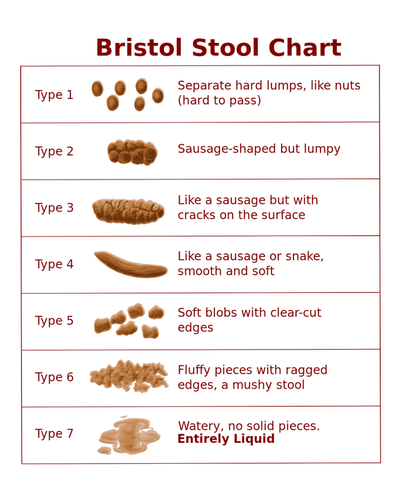 The Bristol Stool Chart is a commonly used visual to help people describe how their bowel movements look to their physicians. Here's the low-down: Type 4 is considered the "perfect poo" - soft, easy to pass, very few/no wiping needed. No cracks, or lumps, even in consistency and color. Type 1-3 equals varying degrees of constipation and dehydration. If we are dehydrated, our body will absorb water wherever it can. Given that our stool is mostly water, you can guess where our body gets some of that liquid. Gross. The longer stool stays in your colon, the more water gets reabsorbed, the drier it gets and more difficulty to pass. Type 5 is typical of people eating a mostly veggie based diet. Type 5-7 points towards malabsorption, food sensitivities or infection. If your stool is loose, runny or very frequent, it is likely that it is passing too quickly through the colon. Dehydration is also a concern as we can lose massive amounts of fluid via diarrhea. Eliminating foods that cause inflammation, treating infections or parasites, adding fibre, proper hydration and some botanicals to slow absorption can be very helpful in these cases.  If this looks a little more familiar to you, great, I'm all for everyone being on the same page. We may have also found out why you have IBS since processed foods like these often worsen IBS. If you or someone you know is experiencing Irritable Bowel Syndrome, please book a consultation with me to discuss your options. I have worked with many people experiencing a range of digestive issues using a blend of nutritional medicine, supplements, stress management techniques and acupuncture to help them experience lasting relief. 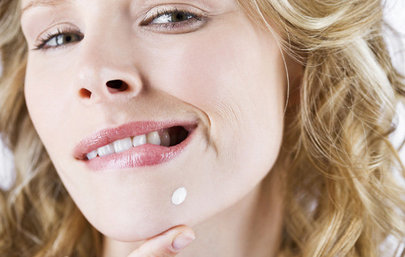 http://vipmobiledayspa.wordpress.com/2013/06/28/super-foods-that-fight-acne/ http://vipmobiledayspa.wordpress.com/2013/06/28/super-foods-that-fight-acne/ Ugh. 7 am. There's a bright red, angry monster that somehow took up residence on your chin overnight and is now staring back at you in the mirror. The beast hurts when you touch it. It is also probably giving you the stink-eye, just in time for your incredibly important interview. I've been there too. As a teen I had acne so bad it covered my face, chest and back. I went through years of antibiotic creams, washes, birth control pills that I never wanted, and Proactive facial care systems that stained all of my mother's towels. I was even on Accutane for two years. A high dose pharmaceutical variation on Vitamin A, Isotretinoin or Accutane, is commonly prescribed for severe cystic acne. While it is known teratogen (meaning that it is known to cause severe birth defects), a less common side effect of the drug is anxiety, depression and even suicidality. Fun times for me, when both me and my high school boyfriend were taking long courses of Accutane. It worked, however it was a pretty dark time and I'm lucky my family was so patient with me. It has since been taken off the market in Canada due to a possible link between use and Inflammatory Bowel Disease. Yikes! Acne vulgaris (the medical, even uglier sounding term) can be caused by a number of concerns, including: Hormonal imbalances - excess testosterone, or excess estrogen, PCOS, puberty, pregnancy/post-partum, menopause hormonal changes Food sensitivities - dairy, gluten, eggs are the most common although there are many other possible culprits, sugar, preservatives Digestive Weakness - low stomach acidity, excess protein (often from conventionally raised animals whose meat is pro-inflammatory and hormone-laden), poor gut flora, recent antibiotic use Medications - corticosteroids, oral contraceptives, anabolic steroids Allergies - cosmetics, chemicals, fragrances, clothing material, detergent Stress - lack of sleep, stress hormones in overdrive, less-than-scrupulous (or overly vigorous) hygiene But I'm not a teenager anymore! While it can be pretty devastating dealing with acne as a teen, most of us grow out of it. However, some people have acne lasting well into their 30's and 40's. Many others are suddenly faced with some angry crops of acne as adults. Several women I see with adult acne struggle to be taken seriously in their professional lives while feeling that that they look like a kid. Acne is not uncommon in the body-building world either, as anabolic steroids, sweaty work-out cloths and high amounts of whey protein powders can contribute to facial and b-acne. In these cases, look to food sensitivities and other environmental factors. Another form of adult acne, Rosaceae, is often related to low stomach acid or or food sensitivities. So what can I do for my adult acne? 1. Ditch the chemical laden products - Check out EWG's Skin Deep Cosmetic Database to determine if your cosmetics and personal care products could be contributing to your symptoms. Pay particular to expensive high-end brands - many of them have some particularly nasty ingredients. 2. Switch to raw honey as a facial cleanser. Full of good bacteria, honey acts as a skin normalizer for both oily and dry skin and promotes healing. 3. a) Limit sugar, dairy and processed foods. Low glycemic diet and acne (American Journal of Clinical Nutrition, 2007), Acne: the role of medical nutrition therapy (Journal of the Academy of Nutrition and Dietetics, 2013) b) Clean up your diet. Focus on lots of orange and yellow fruits and vegetables like carrots, winter squash, and pumpkin as they contain beta-carotene to help improve skin health. Leafy greens such as dandelion, beet greens, spinach, kale, chard, water cress, blue-green algae (spirulina, seaweeds) tonify the liver to help balance hormones. Mung beans, adzuki beans, unpeeled cucumber slices, alfalfa and soy sprouts are all used in Traditional Chinese Medicine for the treatment of acne as well. 4. Drink lots of water and green tea. Your kidneys and liver filter toxins out of your body - staying well hydrated assists this function. 5. Adopt a regular stress management practice. Acne is associated with lower self-esteem, higher and rates of depression - Understanding the burden of adult female acne (Journal of Aesthetic and Clinical Dermatology, 2014). Yoga, deep breathing, and exercise can be helpful for confidence breathing, handling stress and improving your quality of life. Check out Jean's story... this is a great example of how naturopathic medicine can help treat adult acne with amazing results! Naturopathic approaches to acne involve removing food sensitivities, creating a tailored supplement protocol, stress management exercises and hormonal support as needed to help resolve current acne, minimize scarring and reduce the occurrence of future outbreaks. If you are struggling with acne - whether you are a teen or a grandmother or anywhere in between - let's set up a time to chat. Here's to your clear skin! Dr. Keila 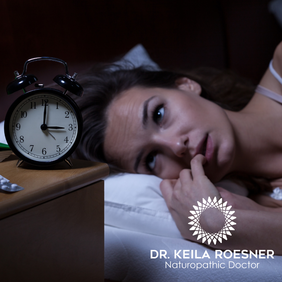
It was 2 pm and I was sitting in my first year physiology class at the Canadian College of Naturopathic Medicine.
I knew that it was important to stay awake but the more I tried to focus on my professor's words, I Just. Kept. Falling. Asleep. It felt so good, telling myself that I would just rest my eyes while listening to how the kidneys are supposed to work. Unfortunately I would wake with a gasp about every two minutes. I always blew my cover. I had told myself that I was just tired, that I didn't need to see anyone. I knew I didn't want the zombie pills that many of my family members were taking, you know, being a first year Naturopathic student and all. I needed help. That was the first time that I consulted a Naturopathic Doctor. Insomnia is one of the most common reasons for people to seek health care. Indeed, the vast majority of the patients I see have some sleep issues and are sometimes surprised to be told that they have insomnia. People with insomnia often have difficulty either falling or staying asleep, wake up too early and may feel un-refreshed in the morning. Insomniacs are also more likely to develop depression, anxiety, high blood pressure, heart disease, insulin resistance, diabetes, be overweight or obese, report substance abuse, have poorer cognitive performance and memory and take sick days from work. In other words, many of us are not sleeping and it is a problem. So what did I do? I learned the hard way. I know what it is like trying to function when you need to be at your best...and failing. I also learned that a few simple hacks can make all the difference. The Essentials for Good Sleep and Preventing Insomnia, Naturally:
If after implementing all of these measures consistently you are still having trouble sleeping, know that there are many options to help support you. As a Naturopathic Doctor, my role is to help identify the factors that may be contributing to your poor sleep, and helping you to create a treatment plan that is tailored to suit your lifestyle. I use a combination of therapies with great success to get my patients sleeping well. If you are interested in how I can help you, you are welcome to book a Health Discovery Session with me. I have helped many people, just like you, to get a good night's rest naturally. And me? I sleep like a baby now.
Are you overwhelmed trying to find a health care provider that "gets it"? Someone that is legit, not too woo-woo and who cares about you? You'll want to pay close attention if you are looking for a professional with a natural approach.
 Find a doctor that gets it. Find a doctor that gets it.
1. They should be licensed.
Look for somebody with an accredited degree. For example, seeing a Doctor of Naturopathic Medicine, Doctor of Chiropractic, Doctor of Osteopathy, Registered Massage Therapist, Licensed Acupuncturist etc. means that they have completed an undergraduate degree, followed by specialized post-graduate degree and standardized licensing exams. Although there are lots of great weekend courses out there, there is no substitute for a rigorous medical education when it comes to your health. 2. A good referral network and social media following. You want to know that you are in good hands. If friends or family members are having good results with a certain practitioner, ask who they are seeing. Most people are only too happy to recommend their go-to person. Likewise, check for social media involvement - a website that is frequently updated, blog, Facebook, Twitter, YouTube videos etc. etc. show that the practitioner is engaged with current health issues and welcomes patients who are ready to "do the work". A good practitioner also knows when it is time to refer you elsewhere. 3. Experience in treating your concerns... Ask if the practitioner has ever worked with someone who has similar concerns. If there is a positive track-record working with people also experiencing acne, migraines, hypertension, or anxiety (for example) the Naturopathic Doctor probably has tried several different approaches, and has a few favorite strategies in mind. 4. ..and willing to look outside the box for answers. We are all different. What worked for your neighbour's Irritable Bowel Syndrome may not work for you. You want to know that your naturopath won't throw in the towel if the tried-and-trues are not getting you the results that you want. 5. Someone with whom you feel comfortable expressing your concerns, thoughts and opinions. This is by far the most important of all. Regardless of the piece of paper on the office wall, the number of years in practice or how busy the waiting room, you want to feel comfortable. Your naturopath, chiropractor, massage therapist, or acupuncturist should want to know how you are experiencing your symptoms. You should never feel pressured into treatments that you are uncomfortable with or come home with hundreds of dollars in supplements that you don't why you're taking. You should feel free to be honest, express your concerns and get feedback. I have practiced Naturopathic Medicine and acupuncture in Stratford, ON since 2013, and previously at the RSNC, Sherbourne Health Centre and Anishnawbe Toronto. I am licensed with the College of Naturopaths, OAND and CAND. I love working with a wide variety of health conditions in children, teens, men and women have great results with lots of people just like you. My bottom line is that I treat people, not just their disease. If you are looking to improve your health and want the highest quality of care book a Health Doscvery Session to see how I can help you. Dr. Keila Roesner Your Stratford Naturopath  Why yes, I have been growing my hair out! Why yes, I have been growing my hair out! Right now, it seems like spring is just a far off promise. The cardinal in our yard is singing his little heart out, but I'm still looking at my winter boots. After spending so much time indoors, with recycled indoor air and way less sunlight all winter long I go searching for things to remind me that there is still hope for spring. Can you tell that I'm getting a little squirrel-y? Enter Canada Blooms 2014. Canada's largest annual horticultural and floral exhibition always lifts my spirits. Being married to landscape construction-turned-horticultural wizard, we always make the show a priority. I just love the earthy smells, the colors of fresh hyacinths and tulips, the giddy energy in the air and the incredible walk-through displays. My favorite part however is picking seeds! In general, we try to aim for plants that are not super high-maintenance, and are drought, mildew and heat resistant with good yields. Last year we had a beautiful crop of Red Russian Kale from Urban Harvest. A Canadian company known for carrying a large selection of heirloom fruit, vegetable, herb and flower varieties, all of their seeds are also 100% organic certified. As much as I like to support my local greenhouses, I love knowing that I am helping to encourage organic producers to carry older, unique varieties rather than the standard few varieties you typically see in commercial seedlings. From a political point of view, small companies and individuals growing and saving unique cultivars decrease the absolute dependence on government and large-scale seed companies for supplying most (if not all) seeds for home and commercial food production. I always liked to go against the grain. This year, we are trying our hand at Red Hot Rocket peppers, Lipstick sweet peppers, Tiny Tim cherry tomatoes, Eva Purple Ball tomatoes, Black Beauty zucchini, spaghetti squash, Pumpkin Winter Luxury Pie, Cippolini Yellow onions, Buttercrunch lettuce and a 5 Mustard Green Mix (including Mizuna, Arugula, Tatsoi, Red Mustard). We will also be giving our favorite kale a large reprise - it's just so good in salads, stir fries and smoothies! If you are interested in growing your own garden and are looking for some inspiration, check out this awesome video - Roger Doiron - A Subversive Plot: How to Grow a Revolution in Your Own Backyard. I watch it every spring to get fired up about my own small revolution. Happy dreaming! 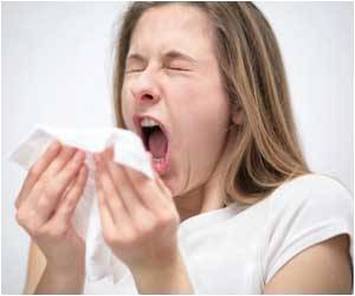 Note that most of us don't look this put together when we're at home with a cold. There's probably more fall-out and stains on our dazzling white T-shirts. Note that most of us don't look this put together when we're at home with a cold. There's probably more fall-out and stains on our dazzling white T-shirts. Tackling the common cold naturally is easy. Here's how I recover when I'm feeling under the weather. Like the beginning of my relationship with my husband, it all started with a tickle. It quickly progressed to a fever. (Fever! In the morning, fever all throuu--gh the night!). I had it and I had it bad. Only this time I'm talking about a cold. I knew after a few weeks of irregular bedtimes, post-Valentines chocolate haze and some business decisions my body was telling me that it was time to take better care of myself. All in all I was only out for three days, but during that time I slept like it was my job. I'm feeling much better because, you know what? I've got some tricks up my sleeve. Want to know what this ND does when a cold strikes? Yes, you do. Licorice root tea
Ginger decoctions
Warming socks
Yoga
Sleep
If your family is interested in cold & flu prevention, naturally, book a FREE 15 minute appointment with me to learn how I can help you. Be well. The new Federal Budget was announced yesterday and amoung the new changes is HST exemption for Naturopathic Medicine. Previously, clients needed to pay the added 13% HST fee on top of the cost of regular Naturopathic visits. This fee schedule was unlike other health care providers like chiropractors, dieticians, dental hygenists, midwives, massage therapists, optometrists, physiotherapists and most recently, acupuncturists that are a part of the Regulated Health Professions Act (RHPA). Naturopathic Doctors are expected to move under the umbrella of the RHPA in the spring of 2014, a move that has been a long time coming. Up until 2007, NDs were regulated under the antiquated Drugless Practitioners Act. In anticipation of proclamation, NDs have now established a formal College of Naturopaths of Ontario and are currently legislated under the Naturopathy Act. Bottom line: we are removing the barriers towards access of primary care for people in Canada... and we now have more options. "Removing HST results in a 13% decrease in the cost of seeing a Naturopathic Doctor" |
Top 75 Naturopath Blogs & Websites For Naturopathic DoctorsAuthorDr. Keila Roesner is a Naturopathic Doctor. When not treating patients she is also an enthusiastic barefoot-strolling, music-loving, yoga-doing kitchen wiz - who also happens to be a wrestling fan. Categories
All
|
Let us take you from hormonal to whole.
|
Dr. Keila Roesner, BHSc ND
Naturopathic Doctor, Hormone Warrior and Your Wellness Cheerleader 247 Church Street, Stratford ON N5A 2R7 (519) 273-0900 [email protected] |
|


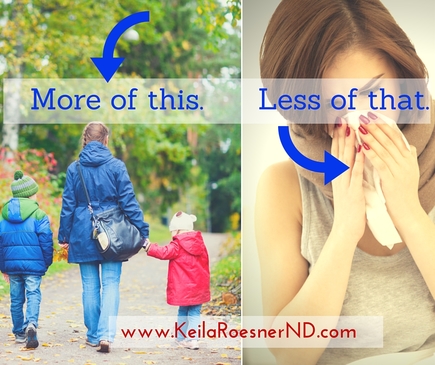

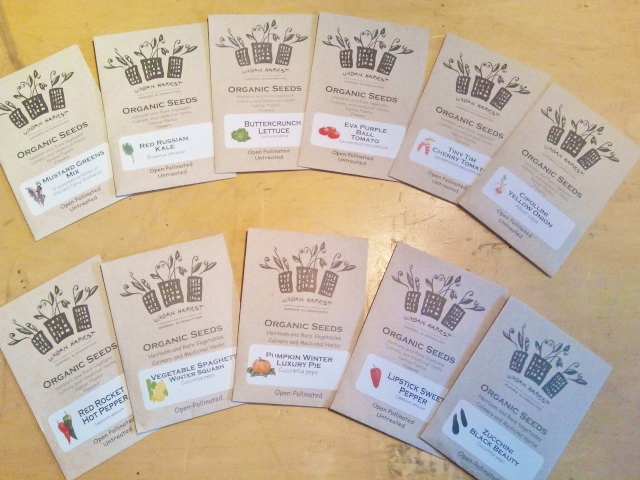

 RSS Feed
RSS Feed